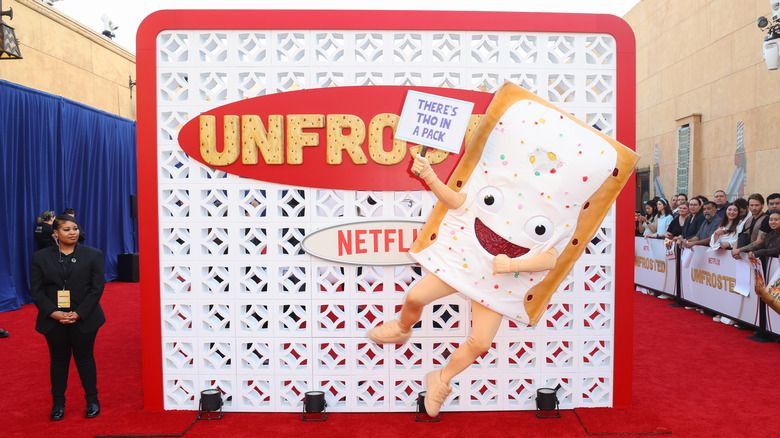The Biggest Lies Unfrosted Told About The History Of Pop-Tarts
Comedian Jerry Seinfeld's new movie "Unfrosted" is streaming on Netflix, and instead of it being his typical stand-up performance, it's a not-entirely-accurate history of the venerable toaster pastries known as Pop-Tarts. For his part, Seinfeld happily admits that he didn't set out to make a documentary, telling Netflix that most of the movie is "complete lunacy." Having said that, it turns out that much of the history presented in "Unfrosted" (the rivalry between Post and Kellogg's; the former's competitive product with the unfortunate name Country Squares) is true to life. But there are several parts of "Unfrosted" that were (hilariously) invented out of whole cloth, chief among them being Seinfeld's character (the fictional Pop-Tarts creator Bob Cabana), as well as the incompetent Kellogg's chief executive played by co-star Jim Gaffigan.
But that's not all of the sweet little lies "Unfrosted" is telling about Pop-Tarts: The movie's screamingly-funny list of rejected product names (Fruit-Magoos and Oblong Nibblers being only two) come from the fertile minds of professional comedians; the actual rejected first name for Pop-Tarts was the exquisitely boring Fruit Scones. The fact is that the history of breakfast food manufacturing wars doesn't need a lot of comedic dressing up, as it's already absurd.
A breakfast food battlefield
In the late 19th century, the Kellogg brothers invented a breakfast cereal made from toasted flakes of wheat (later corn) for patients of a health resort where both men worked. The cereal was intended to be bland — primarily as an aid to indigestion, but also because John Kellogg believed that a plain diet discouraged masturbation; a habit he considered would lead to various illnesses and eventual insanity. Corn Flakes (initially named Granose) became such a hit that an ex-patient by the name of C.W. Post began selling knock-offs of different Kellogg's health foods by 1895, prompting the Kellogg brothers to start their own cereal company soon after. Both Post and Kellogg's massively successful cereal companies were located in the aptly-named Michigan town of Battle Creek, where "Unfrosted" is set.
By the 1960s, Post and Kellogg's had become each other's primary competitor, vying to stay at the top of a very profitable heap. Kellogg's had already invented Rice Krispies, but as "Unfrosted" accurately depicts, Post actually came up with a toaster-prepared, fruit-filled, foil-wrapped dehydrated breakfast pastry first — but made the mistake of announcing Country Squares to the press months before being able to ship the product to stores, allowing Kellogg's to (frantically, we would assume) invent Pop-Tarts and roll 'em out in the same year. And, while "Unfrosted" inaccurately claims that the first shipment of Pop-Tarts sold out in 60 seconds, the reality is not far off: It actually took two weeks.
Lies, or white lies?
While it's clear that "Unfrosted" takes some liberty with the truth, it mostly builds on actual history: Kellogg's and Post's very real rivalry, Pop-Tarts' (almost) overnight success, and the patent absurdity of grown men inventing dumb names for cheap breakfast food in a multi-million dollar marketplace. The other way that the movie gets history right is the fact that all Pop-Tarts were originally unfrosted — the frosted versions wouldn't be rolled out for another three years.
This is a distant echo of Corn Flakes, the first Kellogg's breakfast product, as they too were originally made without sugar. It was brother Will Kellogg who had the idea of sweetening and mass-producing the cereal under the company name of Kellogg's, which not only led to unprecedented financial success but litigation and bad feelings between the two Kellogg brothers for decades. But that's just one of several things you didn't know about Corn Flakes, including how they can be an important part of an easy apple crisp. Regardless, you should watch out for both truths and liberties in the new film.


